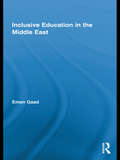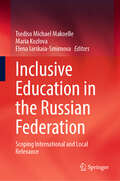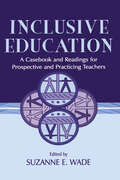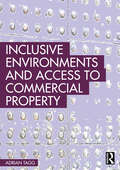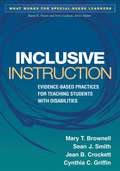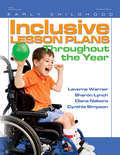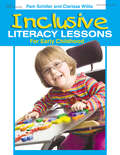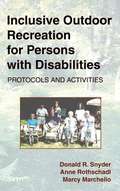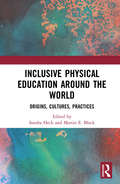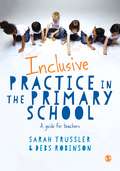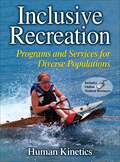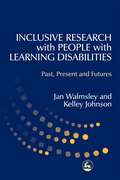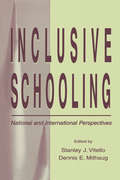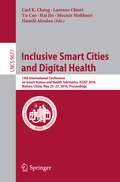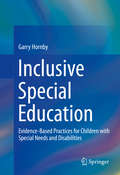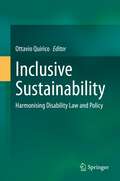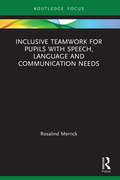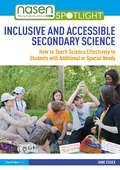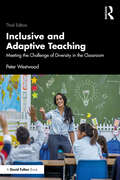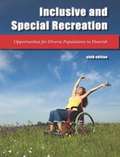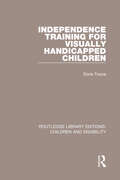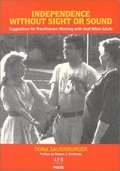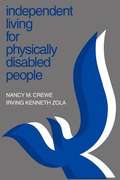- Table View
- List View
Inclusive Education in the Middle East (Routledge Research in Education)
by Eman GaadThe potential of adopting inclusive education to support learning for all is an international phenomenon that is finding its way to the Middle East and the Arabian region. Eman Gaad examines the current status of inclusive education in Arabia and the Middle East through an assessment of the latest international, regional, and local research into inclusive education. With a focus on the more complex areas of related cultural practice and attitudes towards inclusive education in this dynamic and fast-changing part of the world, Gaad offers a research-based analysis of the current educational status of the Arabian Gulf and some Middle Eastern countries that adopted inclusive practice in education, and others that are yet to follow. This book will be of great interest to students, academics, teachers, and therapists in the field of comparative and inclusive education as well as those with an interest in policies of education in the dynamic and culturally distinguished Middle Eastern Arabian region.
Inclusive Education in the Russian Federation: Scoping International and Local Relevance
by Elena Iarskaia-Smirnova Tsediso Michael Makoelle Maria KozlovaMarketing text: This book provides the first evidence-based accounts of inclusive education in a Russian context. It explores the critical educational changes in the Russian Federation within the post-soviet space and internationally. The book analyzes the transformation of educational practices as Russia transitions from an educational model of student support with an emphasis on disability to a broader conceptualization of inclusive education. Among others, this book discusses inclusive education in the context of: • School and preschool institutions; • higher education institutions; • non-Russian-speaking children and children with migration experience; • culture-sensitive education; • indigenous minorities; • technological and methodological support; • the role of stakeholders such as NGOs, parents, and other social groups; • teacher preparation and professional development. This book is intended for teachers, inclusive education coordinators, principals and school managers, policymakers, teacher educators, scholars of inclusion, and university professors, along with community organizations and students of inclusive courses in a Master in Education.
Inclusive Education: A Casebook and Readings for Prospective and Practicing Teachers
by Suzanne E. WadeInclusive Education includes two sections: readings and cases. The readings present approaches for creating inclusive classrooms and schools; their purpose is to give prospective and practicing teachers background information in curricular, instructional, assessment, and collaborative problem-solving strategies that foster inclusive education. The Casebook consists of "An Introduction to Cases" and 14 teaching cases based on actual events as experienced by the case authors that describe in rich detail the experiences of parents, students, and teachers related to inclusive education. Most of the cases pose problems or dilemmas to be resolved--including the struggles of parents seeking inclusive education for their children; students' attempts to succeed in general education classrooms; special educators', principals' and teachers' experiences as they collaborate in moving toward inclusive programs; and teachers' concerns for the future success of their students.
Inclusive Environments and Access to Commercial Property
by Adrian TaggThis book presents and examines the challenges and compromises required to deliver inclusivity in the existing commercial-built environment and the socio-economic benefits that could result from successfully delivering it.To illuminate the advantages of an inclusive environment to property owners, investors and service providers, the book covers the history of disability and evolution of the legislation and examines the demographics and types of disability to question the ‘one size’ ‘blanket’ approach that currently exists to providing access. Delving further into the characteristics of the commercial property sectors and individual disability-specific requirements, experienced commercial building surveyor, Adrian Tagg, analyses the contradictions in the existing legislation to establish examples of design compromise or reasonable adjustments. He seeks to contextualise public and commercial attitudes to disability and go further to demystify the term ‘reasonable adjustment’, which is used currently as a tool of compromise in providing access. The aim is to assess disability-specific requirements for access, as well as adopt a simplistic approach to developing access solutions to the existing built environment from a consultancy and user perspective.Ultimately, this publication hopes to promote accessibility and inclusion from the perspective of surveyors, investors and landlords working in commercial property. It is not just targeted at those on undergraduate or post-graduate surveying courses, as well as those early career professionals undertaking their APC or post-graduate qualifications, but also at those owning or delivering goods, services and employment from commercial premises who want to make a difference.
Inclusive Instruction
by Sean J. Smith Mary T. BrownellThis accessible book presents research-based strategies for supporting K-8 students with high-incidence disabilities to become accomplished learners. The authors clearly describe the core components of effective inclusive instruction, showing how to recognize and respond to individual students' needs quickly and appropriately. Teachers are provided with essential tools for managing inclusive classrooms; planning a curriculum that fosters concept development across content areas, promotes strategic learning, and builds fluent skill use; and integrating technology into instruction. Case examples illustrate ways that special and general education teachers can work together successfully to solve complex learning problems and improve outcomes for students who are struggling.
Inclusive Lesson Plans Throughout the Year
by Laverne Warner Cynthia Simpson Diana Nabors Sharon LynchInclusive Lesson Plans Throughout the Year has over 150 lesson plans for teachers who have children with special needs in their early childhood classrooms. Perfect for both beginning teachers and veteran teachers, Inclusive Lesson Plans Throughout the Year helps new teachers develop plans for each day and provides veteran teachers with new ideas and approaches to add spark to their classroom teaching. The first chapter provides information on planning for children's needs, best practices, the learning environment, and planning instructions. The lesson plans in the subsequent chapters are organized by theme and follow a typical school year, offering teachers a plan appropriate for all children.Each lesson plan is complete with learning objectives, the lesson, a review, materials list, directions for preparation, an assessment component, extension activities to connect the lesson to different areas of the curriculum, and adaptations or modifications for children with a variety of special needs.Each lesson plan has accommodations or modifications for children with: * Autism Spectrum Disorder * Speech and language impairments * Visual impairments* Hearing impairments* Orthopedic impairments * ADHD* Cognitive and/or developmental delays * Emotional disturbances
Inclusive Literacy Lessons for Early Childhood
by Clarissa Willis Pam SchillerBest-selling, award-winning authors Pam Schiller and Clarissa Willis have teamed up to create this collection of 100 literacy lessons, designed to introduce children ages 3-6 to a variety of literacy concepts and build important literacy skills. Each of these simple, fun lessons offers adaptations for children with special needs, including:*Visual impairments br>*Hearing impairments br>*Cognitive challenges br>*Motor delays br>*Speech/language delays br>*Emotional/behavior issues br>*The first page of each two-page lesson features a learning objective, a literacy activity, extension activities, a daily reflection, and vocabulary. The second page has adaptations specific to the literacy lesson for children with special needs.A great grab-and-use book for preschool teachers!
Inclusive Outdoor Recreation for Persons with Disabilities: Protocols and Activities
by Donald R. Snyder Anne Rothschadl Marcy MarchelloInstructors can use this text to teach program design principles. Practitioners can use the information to develop programs, services, protocols, and activities to better serve persons with disabilities in their use of the great outdoors.
Inclusive Physical Education Around the World: Origins, Cultures, Practices
by Martin E. Block Sandra HeckInclusive Physical Education Around the World is the first book to survey inclusive physical education worldwide, to examine the history of inclusive physical education across different regions, and to compare their policy, practice and educational cultures. Featuring the work of leading researchers from Africa, Asia, Australia, Europe, the Middle East, North America and South America, the book provides a unique interdisciplinary contribution to the fields of physical education, history and pedagogy. It provides readers with information on the origins and historical development of inclusion in schools and teaches them about different ways that inclusive physical education has grown and is implemented in different countries. This is essential reading for anybody with an interest in physical education, disability sport, adapted physical activity, special educational needs (SEN) teaching or social justice in education. It is a vital resource for postgraduates, researchers and academics who are interested in studies on inclusion and heterogeneity, as well as sport and cultural historians, physical education teachers and students.
Inclusive Practice in the Primary School: A Guide for Teachers
by Sarah Trussler Debs RobinsonDo you want to feel more confident when teaching children with Special Educational Needs and Disabilities (SEND)? Would you like to be a more inclusive teacher? This book provides clear and flexible frameworks for effective inclusive teaching, and explains how to teach and plan for supporting any child's learning, no matter what their needs are. With case studies and activities the book: explains and contextualizes current beliefs towards SEN provides models for practice encourages you to engage in thinking about SEN and inclusion offers interactive reflection points throughout links out to research with suggestions for further reading Whether you're training to be a primary school teacher or already in the classroom this book will make you feel confident to be the inclusive teacher you need to be.
Inclusive Practice in the Primary School: A Guide for Teachers
by Sarah Trussler Debs RobinsonDo you want to feel more confident when teaching children with Special Educational Needs and Disabilities (SEND)? Would you like to be a more inclusive teacher? This book provides clear and flexible frameworks for effective inclusive teaching, and explains how to teach and plan for supporting any child’s learning, no matter what their needs are. With case studies and activities the book: explains and contextualizes current beliefs towards SEN provides models for practice encourages you to engage in thinking about SEN and inclusion offers interactive reflection points throughout links out to research with suggestions for further reading Whether you’re training to be a primary school teacher or already in the classroom this book will make you feel confident to be the inclusive teacher you need to be.
Inclusive Recreation: Programs and Services for Diverse Populations
by Human KineticsEveryone should have the opportunity to enjoy the benefits of recreation. As the demographics of our communities continue to change and expand, it will be more important than ever for recreation professionals to be prepared to provide access to anyone and everyone who wants to participate. In Inclusive Recreation: Programs and Services for Diverse Populations, students will learn to provide programs and services not only to individuals with disabilities but also to people of both sexes and all ages, cultures, ethnicities, races, and religions.
Inclusive Research with People with Learning Disabilities: Past, Present and Futures
by Kelley Johnson Jan WalmsleyIn this thought-provoking book, Jan Walmsley and Kelley Johnson discuss participative approaches to research and provide an up-to-date account of inclusive practice with individuals with learning disabilities. Drawing on evidence from two major studies, they explain how lessons learnt from inclusive research in the learning disability field are applicable to others working with marginalized groups. The authors examine the origins and the process of inclusive research, describing: * how and why it takes place * who carries it out * who funds it * how it is designed * how it relates to policy and practice. They look at the challenges inherent in this work, such as balancing the voice of the researcher with that of disabled participants and clarifying roles within research projects, and explore how it can become more inclusive and empowering. Providing valuable information and advice to researchers, policy makers and students as well as other health and social care professionals, this book presents a comprehensive examination of participative research in social care.
Inclusive Schooling: National and International Perspectives (Rutgers Invitational Symposium on Education Series)
by Dennis E. Mithaug Stanley J. VitelloThis book provides new information on how various inclusion policies have been implemented in different schools and school districts in North America and in a range of European countries. The purpose of inclusion policy is to prevent the marginalization of people who experience unfavorable circumstances in life. It is an approach to the education of students with disabilities that is based on a commitment to what all members of a free society deserve in order to become fully participating members--a fair chance to find a meaningful place in their own communities. This book is a kind of status report on what inclusive education has achieved and what it may achieve in the future for children and youth with disabilities. It describes the philosophical, legal, and practical terrain covered by inclusion policy in general and inclusive schooling in particular. Contributors assess inclusion policy and suggest ways to reconceptualize it, bringing to their data analysis a depth of experience and knowledge about public schooling in their respective countries. Although inclusion of students with disabilities in general education classes has been embraced by politicians and educators calling for equal opportunity in our society and is being incorporated into national and international education laws, it continues to be controversial and the debate is sometimes heated. A goal of this book is to shed some light on this debate. Is inclusion mostly about student placement? Are students with disabilities attaining social and learning membership in general classrooms? Have they benefitted from inclusion? How about students without disabilities? What have been the benefits? Must learning take second priority to socialization and friendship? Are teachers getting the training they need? How do parents feel about inclusion programs? How do students feel? What kind of curricular accommodations should be made? These and other questions are addressed. This volume is based on original papers presented by the contributing authors in October 1997 at the Rutgers Invitational Symposium on Education on Inclusive Schooling: National and International Perspectives.
Inclusive Smart Cities and Digital Health
by Yu Cao Mounir Mokhtari Hai Jin Carl K. Chang Lorenzo Chiari Hamdi AloulouThis book constitutes the proceedings of the 14th International Conference on Smart Homes and Health Telematics, ICOST 2016, held in Wuhan, China, in May 2016. The 39 regular papers, 5 short papers and 1 poster paper included in this volume were carefully reviewed and selected from 83 submissions. They were organized in topical sections named: smart homes, smart urban spaces and new assistive living space concepts in the smart city; e-health for future smart cities; context awareness and autonomous computing; home networks and residential gateways; middleware support for smart homes and health telematic services; e-health and chronic disease management; e-health technology assessment and impact analysis; tele-assistance and tele-rehabilitation; modeling of physical and conceptual information in intelligent environments; medical big data collection, processing and analysis; human machine interfaces; wearable sensors and continuous health monitoring; social, privacy and security issues; mobile health services; and smart rehabilitation technologies.
Inclusive Special Education
by Garry HornbyMuch has been written about special education and about inclusive education, but there have been few attempts to pull these two concepts and approaches together. This book does just that: sets special education within the context of inclusive education. It posits that to include, effectively, all children with special educational needs in schools requires an integration of both concepts, approaches, and techniques. It has never been more timely to publish a book that helps professionals who work with schools, such as psychologists, special education professionals, and counselors, to identify effective practices for children with special needs and provide guidelines for implementing these in inclusive schools.
Inclusive Sustainability: Harmonising Disability Law and Policy
by Ottavio QuiricoIn light of the third-generation concept of ‘inclusive sustainability’, the volume explores the architecture of global disability governance and its degree of harmonisation. The book integrates socio-cultural, economic, political and legal analyses from an international and comparative perspective. The first part of the volume outlines a tripartite systematisation of disability rights for States and non-state persons. In light of essential economic considerations, the second part explores the relationship between disability and specific fundamental rights and regimes, particularly the rights to life, health, education, work and participation. The third part takes an institutional approach and focuses on the way in which the UN and regional organisations regulate disability (rectius, different ability).
Inclusive Teamwork for Pupils with Speech, Language and Communication Needs (Routledge Research in Special Educational Needs)
by Rosalind MerrickThis book provides a rationale for teaching inclusive teamwork and for understanding communication as a collective endeavour. It shows how teamwork can be taught within schools and emphasises the role that classmates have in facilitating good communication, particularly in the face of difficulty. Grounded in evidence from hours of therapy and analysis of children’s accounts of communication and children’s interactions with their peers, the book explores the components of teamwork by looking carefully at the way schoolchildren really interact. It draws on research from the fields of education, psychology and speech and language therapy to propose the framework for a programme suitable for children aged 7 to 14 years, designed to include pupils with speech, language and communication needs. The programme includes activities, a set of criteria to use as an outcome measure and examples of the way that children and young people have responded in practice. In using the inclusive teamwork programme outlined in this book, teachers have the potential to support all children in developing rapport, effective communication and problem-solving skills. Providing a framework designed to meet the needs of all learners, this book will be highly relevant reading for students of education, speech and language therapy and educational psychology, as well as speech and language therapists and practitioners in the field of education.
Inclusive and Accessible Secondary Science: How to Teach Science Effectively to Students with Additional or Special Needs (nasen spotlight)
by Jane EssexDrawing on extensive professional experience and detailed empirical evidence, this resource sets out an insightful, highly practical approach to teaching science to secondary-aged students with learning difficulties and other special educational or additional support needs (SEND/ASN). The book explores the barriers that the secondary school science curriculum currently presents to those who do not learn in the expected way, before providing a wealth of practical strategies to help teachers, in both specialist and mainstream settings, to make science more accessible. Multiple science topics are covered in depth, including living and non-living matter, the periodic table, electrical energy, the solar system, the environment and more. Each topic is supported by extensive teachers’ notes outlining activities that will allow educational practitioners to enact the principles of accessibility in the classroom. With rich field notes and practical takeaways included to accompany key insights, this accessible book will provide science teachers at the secondary school level, as well as support staff and anyone aspiring to teach science to SEN/ASN learners, with the guidance and resources they need to make science education meaningfully inclusive.
Inclusive and Adaptive Teaching: Meeting the Challenge of Diversity in the Classroom
by Peter WestwoodThis new edition of Inclusive and Adaptive Teaching from bestselling author Peter Westwood continues to provide a range of practical strategies for advancing the learning and development of all students in inclusive classrooms. Drawing on the most recent international research into teaching methods, Westwood presents a range of evidence-based strategies for adapting curriculum content, modifying learning activities and resources, and for making any necessary accommodations during assessment. Revised topics in this third edition include a focus on the implications of diversity and exceptionality, the progress made to date in providing inclusive schooling, a presentation of evidence-based methods for teaching mixed-ability classes and ideas for adapting the curriculum and designing teaching materials. New topics in this revised edition include: • how to support students’ self-determination and autonomy; • LGBTQ+ issues for inclusive schools; • the UK ‘engagement model’ for assessing very low-functioning children; • the concept and purposes of a ‘flipped classroom’; • engaging with a Response-to-Intervention Model; • how to support students in vocational colleges and universities. Each chapter contains an up-to-date list of online and print resources available to teachers who wish to pursue topics in greater depth. This text is an invaluable resource for both practicing and trainee teachers and teaching assistants, as well as school principals, school counsellors and educational psychologists.
Inclusive and Special Recreation: Opportunities for Diverse Populations to Flourish
by David R. Austin Youngkhill LeeThis text emphasises the value of inclusive recreation opportunities for all people. It combines an optimistic approach with a strong conceptual foundation grounded in current research. Case studies of inclusive recreation programs in the United States and Canada are included, along with practical advice geared to helping recreation personnel design and implement programs that provide optimal inclusion for persons with disabilities.
Independence Training for Visually Handicapped Children
by Doris ToozeFirst published in 1981, this book was written to help parents and teachers to participate in child-based mobility programmes, covering the needs of visually-handicapped children from pre-school to adulthood. It gives insight into ways in which these figures can make the world meaningful to young children, as well as making them aware of the special training that is necessary to develop the social skills of daily living that a sighted child acquires through imitation. Travel techniques must be learnt to enable these children to move independently and the book describes various methods that can be used by the blind traveller. It also examines the role of physical education and dance, both of particular importance for the visually-handicapped child at school age.
Independence without Sight or Sound: Suggestions for Practitioners Working with Deaf-Blind Adults
by Dona SauerburgerSuggestions for working with deaf-blind adults by an expert on orientation and mobility.
Independent Living Without Sight and Hearing
by Richard KinneyThis is a wonderful resource for blind-deaf individuals and those who interact with them. It covers such topics as communication methods, independence at home, telephones, travel hints and much more.
Independent Living for Physically Disabled People
by Irving Kenneth Zola Nancy M. CreweA text book for students in Rehabilitation Counseling classes.
